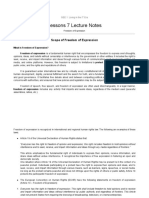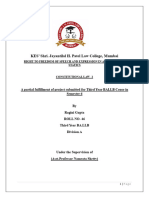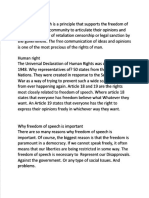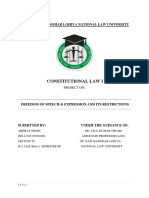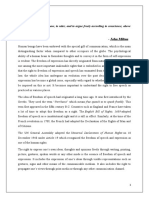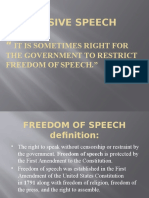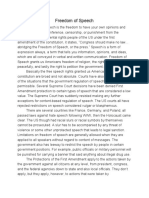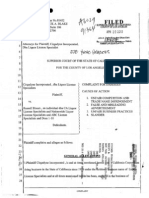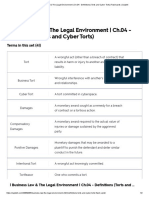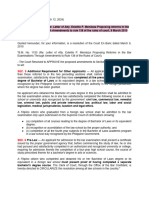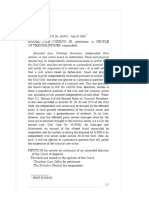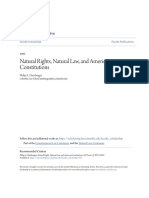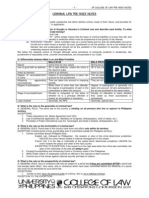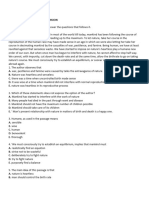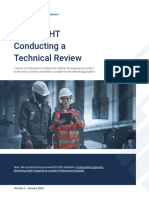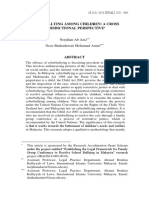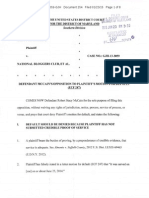FREEDOM OF EXPRESSION
What is Freedom of Expression?
- the right to express one’s opinions and ideas wthout fear of government retaliation or
censorship.
Importance of Freedom of Expression
- essential for democracy and personal development.
= Freedom of Expression is a cornerstone of democratic societies, enabling individuals to freely
express their thoughts, ideas and opinions. Freedom of expression allows people to voice their
opinions, share ideas, and participate in societal and political discourse, thus empowering them
to influence decisions that affect their lives. It is essential for the functioning of a democratic
society. It ensures transparency, accountability, and the protection of other human rights.
Democracies thrive on open debate and the exchange of diverse viewpoints. Freedom of
expression acts as a catalyst for social change by allowing individuals to speak out against
injustices, advocate for reforms, and bring attention to societal issues that need addressing. When
people are free to express their thoughts and share their ideas, it fosters a culture of innovation
and creativity. This can lead to advancements in various fields such as science, technology, and
the arts. It provides a platform for marginalized and minority groups to be heard, promoting
inclusion and diversity. This helps in building a more equitable society where all voices are
valued. The importance of freedom of expression cannot be overstated. It is fundamental to
personal development, democratic governance, and societal progress. Protecting and promoting
the rght is essential for a healthy, vibrant, and inclusive society.
Origins of Freedom of Expression
- Ancient Greece and the Enlightenment
= The origin of freedom of expression can be traced back to ancient Greece, particularly to the
city-state of Athens in the 5th century BCE. The concept of **parrhesia**, meaning "free
speech" or "to speak candidly," was fundamental to Athenian democracy. This principle allowed
citizens to openly discuss and debate ideas in the public assembly, contributing to the democratic
process.
Over time, the idea of freedom of expression evolved and was championed by various
philosophers and thinkers, such as John Milton in his work "Areopagitica" (1644), which argued
against censorship. The Enlightenment period further solidified the importance of free speech as
a natural right inherent to all individuals.
In modern times, freedom of expression is enshrined in international human rights instruments, such
as the Universal Declaration of Human Rights (1948), which states that everyone has the right to
freedom of opinion and expression.
�Legal Framework
- Universal Declaration of Human Rights, Article 19.
“Everyone has the right to freedom of opinion and expression; this right includes freedom to hold
opinions without interference and to seek, receive an impart information and ideas through any media
and regardless of frontiers.”
Philippines has a law regarding of Freedom of Expression
- FREDOM OF SPEECH AND EXPRESSION IN THE PHILIPPINES
The right to freedom of speech and expression is enshrined in Section 4, Article III of the Philippine
Constitution, which states:
“No law shall be passed abridging the freedom of speech, of expression, or of the press, or the right of
the people peaceably to assemble and petition the government for redress of grievances.”
This provision underscores the significance of freedom of speech and expression as a fundamental
right in the Philippines, essential to democratic governance and the functioning of a free society.
1. Scope of the Freedom of Speech and Expression
Freedom of speech covers a wide array of communicative activities, including:
- Spoken and written words,
- Symbolic acts or expressions (such as wearing arm bands, flags, or clothing as political statements)
- Peaceful protests, pickets (a person or group of people protesting), and demonstration
- Artistic works, literature, and media expressions (news media, social media, broadcast media, print
media, digital media, visual media, audio media, advertising media, and artistic media)
This right is not confined to verbal or written communication but extends to all forms of expression
that communicate ideas or sentiments, subject to limitation imposed by law.
2. Limitations on Freedom of Speech and Expression
The right to free of speech and expression is not absolute. The government may impose restrictions
under certain circumstances, provided these restrictions adhere to the following requirements:
� - Must be within the bounds of law. The limitations must be clearly defined in laws passed by
Congress.
- Reasonable and justified. Any restriction must serve a legitimate government interest, such as
national security, public safety, public order, or protection of other’s rights and reputations.
- Content-neutral vs. Content-based regulation:
- Content-neutral regulations are those that regulate the time, place, and manner of speech without
regard to its content (e.g., requiring permits for rallies in public places). These are typically subjected
to intermediate scrutiny, meaning that they must be narrowly tailored to serve an important
government interest and leave open alternative means of communication.
- Content-based regulations, on the other hand, regulate speech based on its message or content
(e.g., censorship of specific political or religious views). These are subject to strict scrutiny, meaning
that the government must show that the regulation is necessary to achieve a compelling state interest
and is the leats restrictive means to do so.
Common Grounds for Limiting Freedom of Speech:
• Libel and Slander: Defamatory statements that damage a person's reputation may be penalized
through libel (for written statements) or slander (for spoken statements). However, truth is generally a
defense in libel cases, and fair comment on matters of public concern is protected under the principle
of qualified privilege.
• Obscenity: Speech that is obscene or immoral may be regulated. Obscenity is judged based on the
standards of contemporary Filipino values and whether the material in question appeals to the
prurient interest.
• Fighting words and incitement to lawless action: Speech that provokes imminent violence or
unlawful conduct can be restricted. In the case of Brandenburg v. Ohio (1969, U.S.), the clear and
present danger test was refined to determine whether the speech was directed to incite imminent
lawless action and was likely to produce such action. This principle has been adopted in Philippine
jurisprudence.
• National security and sedition: The government may limit speech that threatens national security or
advocates rebellion, insurrection, or sedition.
• Hate speech: While the Philippine Constitution does not explicitly address "hate speech," expressions
that incite violence or discrimination based on race, religion, gender, or other protected characteristics
may be subject to regulation.
• Public Morals and Decency: The government can regulate speech that is offensive to public morals,
but this is often subject to judicial scrutiny due to the highly subjective nature of "moral standards."
3. Jurisprudential Tests in Free Speech Cases
Over the years, the Philippine courts, particularly the Supreme Court, have employed various tests to
determine whether a restriction on free speech is constitutional. Some of the most notable tests are:
�• Clear and Present Danger Test: Originating from U.S. jurisprudence, this test determines whether
the speech poses a clear and immediate danger of causing a significant evil that the state has a right to
prevent. This test was applied in cases like Primicias v. Fugoso (1948), where the court upheld the
right of the city mayor to require permits for rallies to ensure public order.
• Balancing of Interests Test: In cases where competing rights or interests are at stake (e.g., the right
to freedom of expression versus national security), the courts weigh the interests involved and
determine which one prevails. This test was used in Gonzales v. COMELEC (1969), where the
Supreme Court upheld the ban on pre-election surveys, balancing freedom of expression against the
state’s interest in fair and orderly elections.
• O’Brien Test (Intermediate Scrutiny): This test is used to assess content-neutral regulations. It
was first articulated in US v. O’Brien (1968) and has been applied in Philippine jurisprudence. The
test has four prongs: the regulation must be within the constitutional power of the government, must
further an important government interest, that interest must be unrelated to the suppression of free
expression, and the incidental restriction on free speech must be no greater than necessary.
• Overbreadth Doctrine: This doctrine invalidates a law that sweeps too broadly and restricts speech
that would otherwise be protected. In Adiong v. COMELEC (1992), the Supreme Court struck down
a Comelec regulation prohibiting the display of campaign stickers on private vehicles, ruling it as
overbroad and a violation of free expression.
• Void-for-Vagueness Doctrine: A law may be invalidated if it is so vague that individuals of ordinary
intelligence cannot understand its meaning or determine what conduct is prohibited. In Estrada v.
Sandiganbayan (2001), the Supreme Court noted that laws affecting freedom of expression must be
clear to avoid undue restriction on speech.
4. Press Freedom
Freedom of expression extends to the freedom of the press, which serves as a watchdog against
government abuses and facilitates the free flow of information necessary for democratic governance.
However, the press is subject to the same limitations on speech mentioned above, such as libel,
obscenity, and national security concerns.
In ABS-CBN Broadcasting Corp. v. COMELEC (2000), the Supreme Court struck down a
regulation prohibiting radio and television stations from selling airtime for political advertisements,
ruling that it violated freedom of expression and press freedom.
THE ROLE OF SOCIAL MEDIA IN FREEDOM OF EXPRESSION
**Introduction:**
Social media has become a powerful tool in modern society, significantly impacting the way
individuals express their thoughts, opinions, and ideas.
�**Body:**
- **Platform for Voices**: Social media provides a platform for people to share their opinions and
engage in discussions, often bypassing traditional gatekeepers like news media. This democratizes
information sharing and enables diverse voices to be heard.
- **Mobilization and Advocacy**: Social media is instrumental in mobilizing social movements and
advocacy campaigns. Hashtags like #MeToo and #BlackLivesMatter have brought global attention to
critical issues, facilitating collective action and change.
- **Challenges and Risks**: While it enhances freedom of expression, social media also presents
challenges such as the spread of misinformation, hate speech, and the need for content moderation.
Balancing free expression with the need to maintain a safe and respectful online environment remains
a complex issue.
**Conclusion:**
Social media plays a crucial role in enhancing freedom of expression by providing accessible
platforms for communication and activism. However, it also necessitates responsible use and effective
moderation to address associated challenges.
FREEDOM OF EXPRESSION IN INFORMATION SYSTEM
### Introduction
Freedom of expression is a fundamental human right that allows individuals to express their thoughts,
ideas, and opinions without fear of censorship or retaliation. In the context of information systems,
this right plays a crucial role in how we interact with technology and digital platforms.
### Body
- **Enabling Open Communication**: Information systems, including the internet and social media
platforms, provide a medium for people to share their opinions and engage in discussions on a global
scale. These systems facilitate the free flow of information, enabling diverse voices to be heard.
�- **Access to Information**: Information systems make it easier to access vast amounts of
information from around the world. This access supports freedom of expression by allowing
individuals to inform themselves, form their own opinions, and share these opinions with others.
- **Digital Platforms as Public Spaces**: Social media platforms, blogs, and other digital forums act
as modern-day public spaces where freedom of expression can thrive. These platforms empower
individuals to raise awareness about issues, mobilize communities, and advocate for change.
- **Challenges and Ethical Considerations**: While information systems promote freedom of
expression, they also face challenges such as misinformation, hate speech, and the need for content
moderation. Striking a balance between maintaining open dialogue and protecting users from harmful
content is a key ethical concern.
- **Impact on Democracy**: Freedom of expression in information systems is vital for democratic
societies. It ensures transparency, accountability, and the ability for citizens to participate in public
discourse. This, in turn, strengthens democratic processes and institutions.
### Conclusion
Freedom of expression within information systems is essential for fostering an open, informed, and
democratic society. As technology continues to evolve, it is crucial to uphold this right while
addressing the ethical challenges that arise in the digital age.
---
I hope this outline helps! If you need more details or further assistance, feel free to let me know. 😊
�5. Freedom of Assembly and Petition
Closely related to freedom of speech and expression is the right to peaceful assembly and to petition
the government for redress of grievances. This right allows people to publicly express their views
through rallies, demonstrations, and protests, provided they remain peaceful and do not incite violence
or disorder.
In Bayan v. Ermita (2006), the Supreme Court ruled that the requirement for permits for assemblies
was constitutional, provided that such permits were granted on a content-neutral basis and were not
used to suppress dissenting opinions.
6. Freedom of Expression in Cyberspace
With the rise of the internet and social media, new issues have emerged regarding freedom of speech
in cyberspace. The Cybercrime Prevention Act of 2012 (Republic Act No. 10175) has been the
subject of controversy, especially its provisions on online libel. In Disini v. Secretary of Justice
(2014), the Supreme Court upheld the constitutionality of online libel but struck down other
provisions of the law, including the takedown clause, which allowed the government to restrict
access to content without judicial approval.
7. Recent Developments
In recent years, freedom of speech and expression has been a focal point in legal debates concerning
anti-terrorism laws and the Anti-Terrorism Act of 2020 (Republic Act No. 11479). Critics argue
that certain provisions of the law, such as those related to the vague definition of "terrorism" and
"incitement to terrorism," could be used to suppress dissent and stifle free speech. As of 2021, the
Supreme Court has upheld most parts of the Anti-Terrorism Act but has modified or invalidated some
provisions that were overly broad.
CONCLUSION
The freedom of speech and expression is a bedrock of democratic society and is fiercely protected
under Philippine law. However, it is not absolute, and certain limitations exist to balance the need for
public order, morality, and national security. The Philippine courts play a critical role in navigating
these limitations, ensuring that government regulations on speech adhere to constitutional standards
and respect individual liberties.

